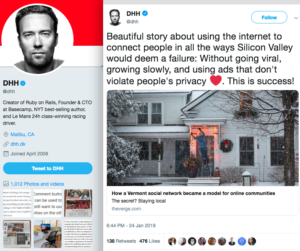Category Archives: Social Networking
A Recipe for a Better Internet
What would the internet look like if it weren’t dominated by a few huge corporations? And is such an internet even possible? A few smart folks at the Initiative for Digital Public Infrastructure have some really interesting ideas about what a more humane and diverse internet might look like. In a short, highly readable paper called “The Three Legged Stool: A Manifesto for a Smaller, Denser Internet”, they outline a different world and explain how to make it happen.The “three legged stool” refers to the three core principles of a better internet:
- A “pluriverse” — as in, plural universe — in which the large platforms are complemented (and challenged) by a diversity of Very Small Online Platforms, or VSOPs. “Just as we do not exclusively gather in shopping malls in the physical world, Facebook, Twitter, and YouTube are not the right place for every community and conversation online,” they explain.
- A “loyal client” that allows people to follow, read, and post as they wish, across multiple platforms. They describe this as analogous to how your email client — whether you use Gmail, or Outlook, or something small like Hey — allows you to email anyone, regardless of what email client they use. And the “loyal” part means you get to both pick a client and adjust its settings to align with your own preferences.
- A “friendly neighborhood algorithm store” where VSOPs can pay a reasonable price to access capabilities that, at present, only the big guys can afford: things like recommender systems, spam detection, and anti-abuse tools. Just as small businesses have access to high-powered tools for accounting, payroll, and other core functions, small online platforms should be able to provide high-quality experiences without having to spend billions to develop it all from scratch.
Front Porch Forum is a strong believer in a diverse and people-centric internet. We’re pleased to be working towards that future in the company of smart and committed folks like these. Let’s build a better internet together!
Fixing Digital Public Spaces
Leslie Stebbins was quoted in a recent Salon article, “Our digital public spaces aren’t so healthy… Can we fix that?” (read full article here) that…
“Tech companies maintain that they cannot moderate online communities because that would jeopardize our right to free speech and because there is simply too much content flying across these networks to track. Both these issues are false flags. We now know that the core infrastructure of these platforms is intentionally designed to amplify vitriol and misinformation because this increases engagement, keeps us online longer, and provides tech companies with billions of dollars from ad revenue. It doesn’t have to be this way.“
Further, Stebbins adds, “We should focus on creating new spaces that have explicit civic goals and are designed for equity and social cohesion. Real-world communities need to be involved in intentionally designing their own local digital public spaces rather than leaving this work to global tech companies.”
Front Porch Forum gets a nice spotlight in the article…
“Front Porch Forum […] focuses on real world community building. It is the antithesis of Facebook, TikTok, and Twitter. Rather than try to keep users online, it strives to get people offline and more connected to their local Vermont neighbors. Most people spend five or ten minutes a day online to get news that their neighbors have posted: lost dogs, bake sales and announcements of upcoming school board meetings. It is funded by donations and local ads based on where someone lives, but it does not track user behavior and advertising does not drive platform design.“
“Independent research on Front Porch [Forum] shows that it builds social cohesion and is improving the resilience of local Vermont communities. Building stronger community cohesion produces many intangible benefits such as high civic engagement, more instances of neighbors helping neighbors, and lower crime rates.“
Solving Social Media’s ‘Local Paradox’
A new article in a Stanford University journal underscores various failures of Big Tech social media, and highlights Vermont’s own Front Porch Forum as a better way.
In the bowels of social media giants, like NextDoor and Facebook, live online spaces for local social networks to take hold (e.g., a neighborhood based Facebook group).
One might think a healthy form of social connection would come from these local online networks because they’re grounded in real-world relationships and physical space — you could literally bump into that posting’s author on your way to school drop off — but in practice, as this article points out, local social media can be even more toxic than global platforms. It’s dubbed the ‘local paradox‘.
The solution to this local paradox, they say, is to build networks that are values-driven, closely moderated, trusted, and local. Further, they share Front Porch Forum as a leading example.
FPF on Reimagining the Internet
Front Porch Forum‘s Co-founder, Michael Wood-Lewis, joined Ethan Zuckerman of Reimagining the Internet for an interview on running a healthy online community. Reimagining the Internet is a podcast that talks to experts in the field about what isn’t working with social media and how it can be improved. Jimmy Wales, the founder of Wikipedia, was also a recent guest of the podcast.
Give this great interview a listen!
For more on FPF check out FPF in the news!
“Treating Loneliness as a Medical Condition”
 Studies are showing loneliness is having a negative impact on individuals’ health. Strong communities and social connectivity help individuals experiencing loneliness to improve their health and wellness.
Studies are showing loneliness is having a negative impact on individuals’ health. Strong communities and social connectivity help individuals experiencing loneliness to improve their health and wellness.
Reasons to be Cheerful published an article about a clinic in England that started working with lonely patients to find resources and opportunities to connect with others, building up social capital and decreasing health spending. People known as health connectors began to facilitate discussions with lonely patients.
“These health connectors could connect the patients to traditional medical services, but also to social services: discussion groups, a “shed” where men could come together to work on projects, group exercise classes, help with shopping, help joining a community choir, even a befriending service.”
Read the full article here.
20-somethings making use of FPF
A younger generation has figured out how to use Front Porch Forum to their benefit:
 “Wondering if there is a local book club I could join or if anyone wants to start a new book club for 20-somethings!” • Amanda in Hinesburg
“Wondering if there is a local book club I could join or if anyone wants to start a new book club for 20-somethings!” • Amanda in Hinesburg
And a new friend was found after this posting: “Here’s a shout out to any other college students who are spending the summer on the island. Is anyone out there?” • Darcy in No. Hero
Looking to make new connections with like-aged people? Post on FPF!
“Go West, Young Company: Front Porch Forum Expands Into New York State”
 Front Porch Forum has made its first significant out-of-state expansion and is now serving parts of New York, where about 1,500 members have joined so far.
Front Porch Forum has made its first significant out-of-state expansion and is now serving parts of New York, where about 1,500 members have joined so far.
“Now the free, hyperlocal social network has 170,000 members around Vermont and is striking into new territory: upstate New York. In June, the company launched its first major expansion outside of the Green Mountain State, into New York’s Washington County, a rural stretch that borders Vermont in the Slate Valley; and Warren County, which contains Glens Falls. ”
Read the full story by Molly Walsh of Seven Days here.
The secret? Staying local
We’re seeing an outpouring of interest in Front Porch Forum in light of the recently published article on the Verge!
Andrew Liptak, author of the Verge article “How a Vermont social network became a model for online communities,” writes “Vermont’s Front Porch Forum is a good example of how to create a positive, online community – staying local.”
 Creator of Ruby on Rails and founder/CTO at Basecamp, David Hanemeier Hanson, saw the article and tweeted on his feed. Then Jack Dorsey, a founder of Twitter and Square, retweeted it. Clearly the work we’re doing is being recognized! Thanks @dhh, @jack and the many others who have shared this article.
Creator of Ruby on Rails and founder/CTO at Basecamp, David Hanemeier Hanson, saw the article and tweeted on his feed. Then Jack Dorsey, a founder of Twitter and Square, retweeted it. Clearly the work we’re doing is being recognized! Thanks @dhh, @jack and the many others who have shared this article.
“Front Porch Forum isn’t designed as a virtual replacement for one’s real-world neighborhood it’s meant to facilitate those everyday, in-person connections that form the basis of a community.”
About Blog
Ghost of Midnight is an online journal about fostering community within neighborhoods, with a special focus on Front Porch Forum (FPF). My wife, Valerie, and I founded FPF in 2006... read more
Post Categories
- Uncategorized
- PDF2009
- Calendar
- Northeast Kingdom
- podcast
- Peer Rental
- Localization
- Big Tech
- Events
- PDF2007
- Web Traffic
- Google AdSense
- Pay It Forward
- Elections
- berkmansunlight
- Maps
- Video
- Upstate New York
- Coupons
- Wildlife
- Mobile
- Viral Marketing
- Raffle
- Crisis Response
- Donations
- Lost & Found
- Real Estate
- College Students
- Gratitude
- Social Responsibility
- Orton Family Foundation
- Start ups
- Make It Your Own Awards
- Online Civility
- Clay Shirky
- Newspapers
- Humor
- How To Use FPF
- Online Classified Ads
- Peer Reviews
- Best of FPF
- Politics
- Community Management
- Economic Development
- Local Reviews
- Case Foundation
- Borrow and Lend
- Neighborhood Watch
- Good Government
- Small Business Advertising
- Citizen Journalism
- e-Vermont
- Democracy
- Local Search
- Knight Foundation
- Burlington
- MacArthur Fellows
- Civic Engagement
- Social Media
- social capital
- Social Networking
- Vermont
- Neighborhood
- Community Building
- Local Online
- Front Porch Forum





 AUGH!! My big snapper snowblower was stolen recently from my LOCKED garage. (Thief broke in through the small side door.) If anyone saw anything, knows anything or hears anything please contact the police. I recently moved to Brattleboro – it’s an unsettling ‘welcome to the neighborhood’ to say the least. Thanks in advance for any help that comes my way…
AUGH!! My big snapper snowblower was stolen recently from my LOCKED garage. (Thief broke in through the small side door.) If anyone saw anything, knows anything or hears anything please contact the police. I recently moved to Brattleboro – it’s an unsettling ‘welcome to the neighborhood’ to say the least. Thanks in advance for any help that comes my way…